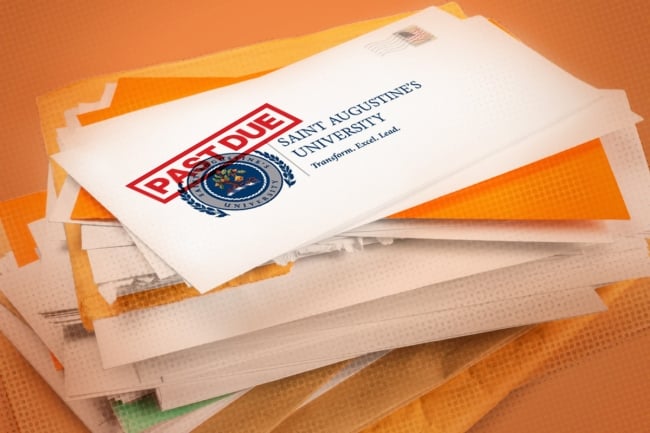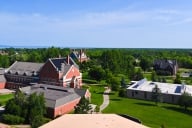You have /5 articles left.
Sign up for a free account or log in.

Saint Augustine’s University is facing a $7.9 million tax lien, among other outstanding debts.
Photo illustration by Justin Morrison/Inside Higher Ed | Getty Images
Struggling financially and fighting to maintain its accreditation, Saint Augustine’s University was dealt another blow last week when the Internal Revenue Service hit it with a $7.9 million lien for unpaid taxes.
In addition to the tax lien, the university has been accused of failing to pay $1 million to various vendors, including FieldTurf USA, which filed a $598,000 lien against SAU in December for alleged nonpayment for an artificial turf field, local TV station WRAL reported.
Now the private historically Black university in North Carolina is scrambling to pay its bills—including making payroll—while fighting to keep its accreditation and dealing with a discrimination complaint from the recently fired ex-president.
Fixing Financial Issues
A scan of Saint Augustine’s public tax filings shows that financial issues are nothing new at the university, which has struggled with a deficit for much of the last decade. Enrollment has also slipped from more than 1,350 in fall 2013 to fewer than 900 in fall 2022, according to the latest numbers from the Department of Education’s Integrated Postsecondary Education Data System.
As it has struggled financially, Saint Augustine’s has also dealt with leadership turnover.
In October 2020, then SAU president Irving McPhail died after contracting COVID-19 just months into the job. His wife, Christine McPhail, soon stepped in as president, but she was fired in December after allegedly clashing with the board at an October meeting. She has since filed a discrimination complaint against Saint Augustine’s Board of Trustees, alleging that the mostly male governing board discriminated against her and other Black women.
Now it’s up to interim president Marcus Burgess to right the ship—and he may not have much time as bills pile up and the university awaits a decision on an appeal from the Southern Association of Colleges and Schools Commission on Colleges, which stripped its accreditation in December over financial and governance issues.
Burgess, who joined SAU that same month, shared an overview of the university’s challenges at a press conference Monday, discussing the financial and accreditation issues. He also offered insights into recent actions taken to address “dire” financial issues.
Burgess said SAU has hired a consulting firm to help with its finances, which the United Negro College Fund is paying for. The university has also met with the IRS and others as it addresses outstanding debt. Further, a forensic audit of SAU’s finances is underway. At the press conference, Burgess made it clear the university’s challenges are significant.
“Each day we keep our lights on and our water running is a blessing,” he said.
Even so, Burgess batted away the idea of closure, telling reporters it’s not imminent. “I don’t even think about that,” he said.
Though a forensic audit would get to the heart of the problems, Burgess said, a lack of internal controls and unpaid student debts have exacerbated the challenges. The university is also on heightened cash monitoring with the Department of Education, creating additional financial stress.
Burgess hinted at likely job cuts to come, noting the specifics have not yet been determined.
The potential loss of accreditation also looms large. A university spokesperson confirmed that SAU officials met with its accreditor Tuesday to appeal the loss of accreditation, though it will likely be a week before a decision is issued. But Burgess said that if the accreditation appeal is denied, the SAU plans to contest the matter.
“If the appeal doesn’t go through, we will then litigate with SACSCOC,” Burgess said Monday.
Rosalind Fuse-Hall, director of legal and governmental affairs and commission support at SACSCOC, noted that the decision will be rendered within a week and then posted online.
Accreditation Limbo
Reeling from its various challenges, the university has little financial cushion to fall back on. Though Burgess noted SAU met its payroll on Friday, it has clearly struggled to pay its bills. Saint Augustine’s endowment was valued at $26 million in fiscal year 2021, a figure that falls far short of the median college endowment value of $209 million reported in a recent study.
Like many HBCUs, Saint Augustine’s has a rich history, tracing its founding back to 1867. Students helped lay the cornerstones during the construction of SAU’s historic chapel in 1895; on Sunday, students, alumni and community members held a candlelight vigil in that very chapel, gathering to pray amid uncertainty about the university’s future.
Now the SAU community awaits answers to those prayers.
While the financial picture is admittedly dire, SAU has some control over its outcome given the potential for fundraising and other levers—including selling off assets, which administrators have explored. By contrast, accreditation remains solely in the hands of outsiders, and oftentimes a university’s loss of accreditation serves as a death blow. Though Burgess has threatened litigation if SAU’s appeal is denied, that’s a legal road few have traveled.
In 2005, Edward Waters College—a private HBCU in Florida that has since changed its name to Edward Waters University—had its accreditation stripped by SACS. At the time, the accrediting body accused it of plagiarizing accreditation materials from Alabama A&M University. Edward Waters appealed, arguing the punishment was too harsh and that the accreditor failed to follow its own rules in stripping recognition. When Edward Waters lost the appeal, it sued, winning reinstatement. Nearly two decades later, Edward Waters remains accredited with SACS.
In another instance, a massage school sued the Accrediting Commission of Career Schools and Colleges in 2012, arguing that it was denied due process when its accreditation was stripped. A judge backed the plaintiff, the Professional Massage Training Center, and also hit the accreditor with a $429,000 fine. However, that decision was overturned on appeal in 2015, and the school soon closed.
Others have simply switched accreditors. Bennett College and Paine College both lost SACSCOC accreditation and their subsequent appeals within the last five years, prompting them to move to another accrediting body: the Transnational Association of Christian Colleges and Schools.
As SAU awaits word of its fate, many in the community are hopeful. And some, including Student Government Association president Ariana White, are grateful despite the challenges. Standing next to Burgess at Monday’s press conference, White shared a story about how the university accepted her when others wouldn’t due to her high school grades. Now a senior, she hopes the university will be around long after she graduates.
“SAU has shown me it’s not about how you start but how you finish,” White said tearfully.








